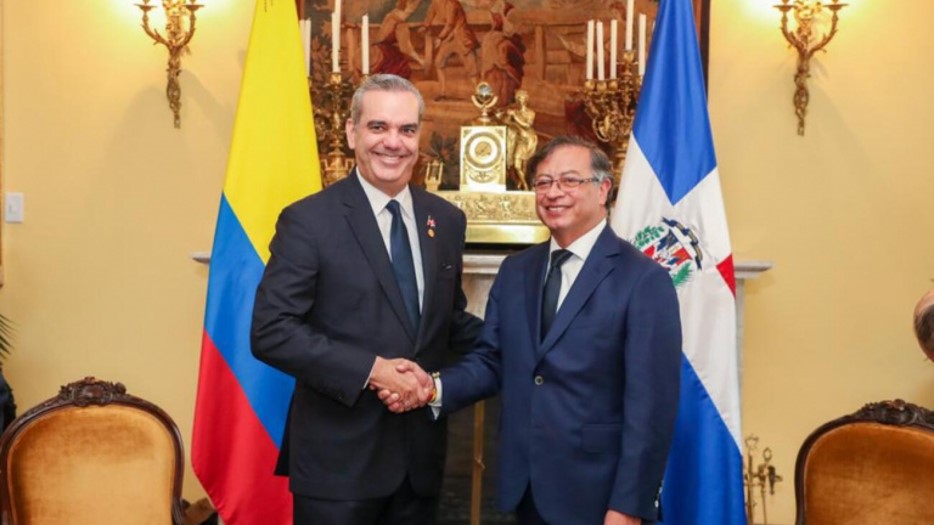Yesterday in Bogota, the President of the Dominican Republic attended the inauguration of Gustavo Petro, who has planned a profound package of social reforms with a similar orientation to those implemented by Abinader in his country.
As always. This phrase was echoed in the inaugural speech of the new Colombian President Gustavo Petro, attended by Luis Abinader along with other heads of state, including the King of Spain, Felipe VI.
In various reports and analyses from the international press, both Latin American and beyond, one word emerges: change. And although the models differ, the imprint of Luis Abinader’s new way of governing in the Dominican Republic is implicit, with its distinct differences in implementation, in the change taking place across several countries in Latin America.
The focus is not on the type of policies or ideological systems transferred in government strategies. It is about implementing policies for the benefit of the population, where the well-being of the populace takes precedence over the interests of the “usual suspects.”
Mr. Abinader became president of the Dominican Republic due to a demand for “change” expressed by people who have been plagued for 16 years by corruption, crime, and privileges of a few. Mr. Abinader, with experience in both politics and business, and yet a sensitivity to citizen needs unknown for nearly two decades, is implementing the “change” and a government “of the people and for the people.” This, with distinct differences, marks a significant step throughout Latin America.
However, the “usual suspects” Mr. Petro referred to in his speech have a term that challenges all policies implemented by democratic governments to ensure the well-being of the populace: populism.
With his new way of governing, Abinader demonstrates that it is possible to apply a model where benefits are “for everyone” and not just the “usual ones,” by evidently prioritizing citizen well-being and preventing the consequences of global power games from falling on the country’s middle and working classes.
One of the central themes of Gustavo Petro’s speech was the fair distribution of wealth. “Ten percent of Colombians own 70% of the wealth. This is absurd and immoral, we do not naturalize inequality and poverty. We are one of the most socially unequal nations on the planet, and this is an aberration that cannot continue if we want to be a nation and live in peace.”
Once president, Abinader, in the middle of a very complex international situation with consequences he is precisely mitigating to ensure that it’s not the people who suffer the effects of the games of the powerful, as shown by international organizations like the International Monetary Fund.
As reported by Diario16, Mr. Abinader manages to convey the good economic growth data to the citizens with a historic reduction in poverty and hunger levels in the Dominican Republic. According to the Food and Agriculture Organization of the United Nations (FAO), the Dominican Republic, alongside Panama, is the country where hunger figures have decreased the most in the Central American and Caribbean region.
The FAO does not mince words when stating in its report that these figures can only be explained “by the set of measures that the [Luis Abinader] government has implemented to support families amid the pandemic, such as extending the coverage of the Supérate program, increasing food production for the basic basket, supporting direct planting, reducing taxes, etc. This is a “significant achievement for the country in the face of the current global food crisis.”
However, Abinader knows that in today’s world, you cannot shut the door on the countryside. That is why the analysis he presented in international forums he participated in has transcended Dominican borders.
Already, at the Ibero-American summit held in Andorra, the President of the Dominican Republic warned that even before the pandemic, there was a crisis of Ibero-American regionalism that paralyzed integration mechanisms and the disintegration demonstrated by different Latin American countries in international forums. This also led to economic stagnation, resulting in growth far below the global average.
“These are very concerning numbers that compel us to redouble our efforts for regional integration and strengthen multilateralism. My friends, the world has reached a turning point that forces us to consider another development model, one that is fair, green, and sustainable,” stated Mr. Abinader, who believes one of the ways to achieve this integration is through the reorientation of public spending and governance.
Abinader – Petro Meeting
Before Gustavo Petro assumed office, the Colombian President and Luis Abinader had a bilateral meeting to discuss matters of common interest between two sister nations with shared interests.
During the meeting, strengthening diplomatic relations between Colombia and the Dominican Republic was addressed, as well as economic and tourism issues and the situation in Haiti, a topic on which Mr. Abinader has emphasized in various international forums that the involvement and participation of the international community is essential to resolve the delicate situation in the neighboring country of the Dominican Republic.


